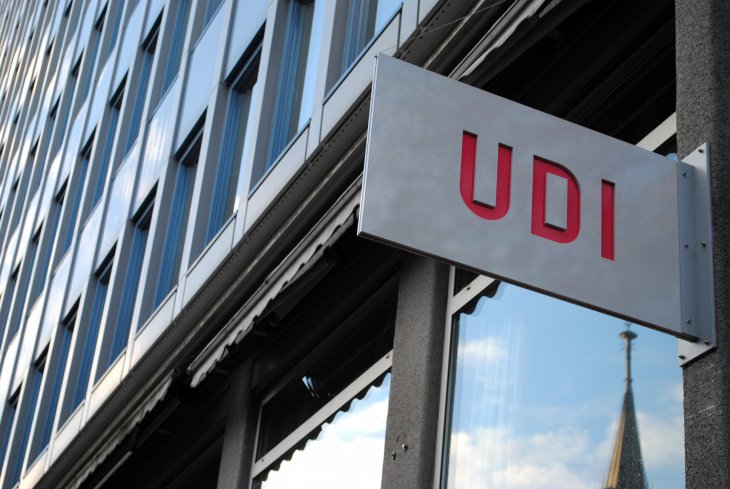While Norway aims to support the struggle for democracy and peace in Myanmar, the Norwegian immigration authorities prevent meaningful collaborations.

Logo of the Norwegian Directorate of Immigration (Utlendingsdirektoratet, UDI) on a sign in Oslo, Norway. Photo: Brage Aronsen.
Everything was ready. In January, he had applied for admission to a Bachelor course at the University of Oslo’s International Summer School, and he had been accepted. The course fee was paid, the plane ticket booked, and the visa application submitted to the Norwegian embassy in Bangkok.
The course was meant to be an important building block for competence building at the institute in Myanmar where he works in an area torn by many decades of repression and armed conflict. The institute is a long-term partner of the Peace Research Institute Oslo (PRIO), and we were proud to be able to sponsor a high quality program, not least in the desperate situation caused by the military coup in 2021. Now that the education system in Myanmar is on the verge of collapse, this kind of competence building and exchange is more important than ever.
On 14 June, ten days before the planned departure, the visa application was rejected by the Norwegian Directorate of Immigration (UDI) “We doubt that you will leave the Schengen area before the expiry date of an issued visa”. UDI has put Myanmar on their red list. By default, the visa applications are therefore rejected.
Norway’s partner country for long-term development
However, Myanmar is also one of the partner countries in Norway’s development policy. This means that Norway aims to support democracy, human rights, capacity building and knowledge production in Myanmar. Ever since the military junta in 1988 massacred students and democracy activists, Norway has been a reliable supporter to the people of Myanmar.
Norway was home to the Democratic Voice of Burma, the radio station that broadcasted news into the closed country. The Ministry of Foreign Affairs has supported countless humanitarian projects, development projects, peace-building initiatives, civil society groups and educational institutions, particularly through support to partners of Norwegian organizations and research institutions. This has had important impact on the struggle for democracy and peace in Myanmar, and has gained renewed significance after the 2021 military coup.
Red listed countries
Support to democratization and peace in Myanmar has been the Norwegian development policy since 1988, and it remains the Norwegian development policy. However, the immigration authority now sits with veto power and effectively prevents important cooperation and knowledge exchange between Norway and Myanmar.
The Norwegian immigration authority operates with a ‘red group’ of 18 countries in which the political situation is considered to be so bad that that people from these countries might want to migrate to Norway. People from these countries should therefore not get a visa. In 2022, UDI decided to put Myanmar in this red group. On what grounds? In 2021, 3 citizens from Myanmar applied for asylum in Norway, in 2022 there were 12, and this year there have been 3. It is unknown whether these actually came to Norway from Myanmar or whether they were first refugees in Thailand or India. In any case, these instances are considered sufficient reason to suspect anyone from Myanmar. “We do not consider you to have sufficiently strong ties to your home country to justify issuing a visa” the rejection letter states.
Poor assessment process
The Norwegian Immigration authority claims that each application receives individual assessments, and in the regulations and guidelines, it is stated that decisive emphasis can be placed on societal or political considerations when granting visas. My experience is that such individual assessments are not made. I have seen identical rejection letters from other research partners. Business people, artists, civil society actors, students and academics—important contributors to Norway’s long-term development cooperation for Myanmar—all receive the same general rejection. My colleague is just one of many.
Embarrassing and sad
This visa policy contributes to a senseless waste of public funds. At the summer school of the University of Oslo, several valuable student spaces are now unused. Both the one intended for my colleague from Myanmar, but also the spaces intended for other international students with rejection letters from UDI.
It has been embarrassing and sad having to explain the arrogant rejection letter to my partners in Myanmar. Our joint research project which this student exchange was supposed to be a part of, is funded by the Ministry of Foreign Affairs through the Asia program of the Research Council of Norway. Yes, Norwegian-funded projects are sabotaged by Norwegian authorities.
Who should define the Norwegian development policy?
However, the most important question I am left with after this incident is: Who should define the Norwegian development policy? Is it the Ministry of Foreign Affairs and the Minister of International Development? Or is it the bureaucrats in UDI?
The valuable skills development, capacity building and educational work that my colleagues offer to youths in war-torn Myanmar, are exactly the kind of projects the country needs. And it is exactly these kinds of projects that Norway wants to support.
My colleagues and other democracy and peace activists risk their own safety for the improvement of their community. The unsubstantiated claims and suspicion about their intentions that they are met with from the Norwegian immigration authority are therefore not only demeaning and out of touch with the realities that these people live in. They also undermine an independent and meaningful Norwegian development policy.
- Marte Nilsen is a Senior Researcher at PRIO.
- This text was published in Norwegian by Aftenposten 9 July 2023.
- Interview with Nilsen in Khrono 11 July 2023 (Norwegian).